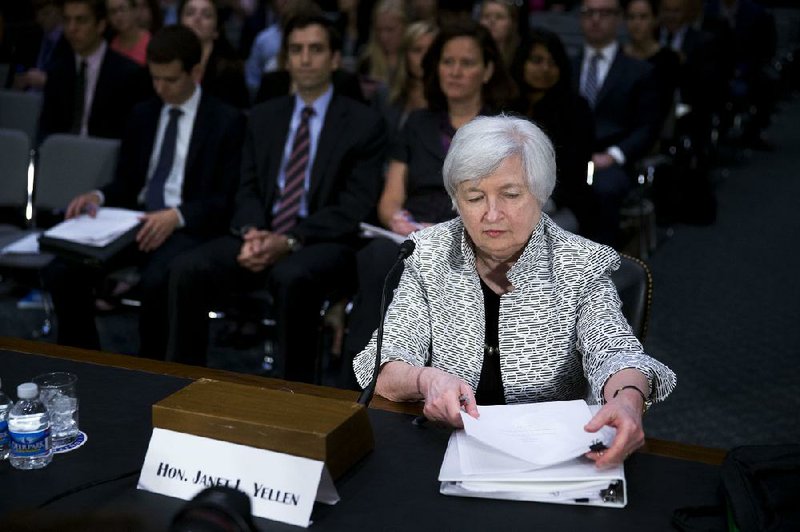WASHINGTON -- Federal Reserve Chairman Janet Yellen told the Senate Banking Committee on Tuesday that the economy continues to grow slowly, that the Fed plans to continue to help, and that the basic situation is not likely to change anytime soon.
"Too many Americans remain unemployed, inflation remains below our longer-run objective, and not all of the necessary financial reform initiatives have been completed," Yellen said.
Yellen's remarks suggested that the Fed's leadership remained largely unmoved by the increasingly vocal arguments of some Fed officials and outside economists that monetary policy has done what it can to revive the economy and that the Fed is in danger of waiting too long and risking future inflation before it begins to raise interest rates.
The central bank plans to end one part of its stimulus campaign, the expansion of its bond holdings, in October, but Yellen made clear that it plans to keep short-term interest rates near zero for some time. She noted the Fed's recent efforts to plan its eventual retreat "do not imply any imminent change in the stance of monetary policy."
Yellen appeared before the committee to present the Fed's biannual report on monetary policy. She will testify today before the House Financial Services Committee.
The economy shrank sharply in the first quarter, but Yellen reiterated in her testimony the Fed's view that growth has since resumed -- although she added that "this bears close watching" -- and its forecast that the economy would continue to grow "at a moderate pace over the next several years."
The decline in the unemployment rate, meanwhile, has exceeded the Fed's expectations, reaching 6.1 percent in June. Some Fed officials, and outside economists, argue that the supply of labor is approaching normal levels and that the Fed should respond by moving more quickly to raise interest rates.
Yellen, in her testimony, maintained her view that the unemployment rate is overstating the progress of the labor market. Some people who stopped looking for work are likely to return as the economy improves, she said. Wage growth also remains weak, suggesting employers still find it easy to replace workers.
Inflation remains sluggish, suggesting that the economy continues to operate below capacity and allowing the Fed to extend its stimulus campaign.
"With wages growing slowly and raw material prices generally flat or moving downward, firms are not facing much in the way of cost pressures that they might otherwise try to pass on," the Fed said in a report accompanying Yellen's testimony.
But Yellen said the Fed was ready to respond if it concluded that it had overestimated the slack in the labor market, a more substantial acknowledgment of the views of her critics than she has made in other recent remarks.
"If the labor market continues to improve more quickly than anticipated by the committee, resulting in faster convergence toward our dual objectives, then increases in the federal funds rate target likely would occur sooner and be more rapid than currently envisioned," Yellen told the Senate committee. "Conversely, if economic performance is disappointing, then the future path of interest rates likely would be more accommodative than currently anticipated."
While Yellen said concerns about financial stability were not sufficient, at present, to warrant a shift in monetary policy, the Fed remained watchful of the potential for destabilizing bubbles in various markets. Valuations in most sectors "remain generally in line with historical norms," but there is evidence of overconfidence in sectors including junk bonds, she said.
The Fed, in its biannual report accompanying the testimony, also cited social-media and biotechnology stocks as potentially overvalued.
Business on 07/16/2014
